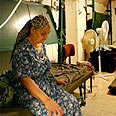
I don't know which old-fashioned imagination came up with this phrase, or from what war movie about productive and optimistic civilians "contributing to the war effort" far from the battle front. But I do know who this lie serves: Those government institutions that have virtually vanished from the civilian front.
It serves the state, whose poor, whose elderly and needy have been abandoned, left without aid, without proper protection, left to worry about the basic elements necessary to live, even during times like these, like human beings.
Thousands of civilians now sit in fetid bomb shelters and bombed-out cities, on moshavim and kibbutzim near the new battle field, citizens the country has privatized.
The country failed to announce it had washed its hands of responsibility for their welfare. They found out not from the state, in some organized fashion, but rather from the thousands of good-hearted people and organizations around the country who took matters into their own hands while official state organs wrote catchy slogans and did nothing.
Home front? Battle front!
No one living in katyusha range is on the home front. They are all on the battle front, in a war that will be remembered – if we even have the strength to remember – as an official disgrace, the greatest civil failure in the history of a country that once knew how to take care of its people, and afterwards only took a polite interest in their well-being, and eventually stopped pretending it was interested.
During the first days of the war, government ministers could have – had they been so inclined – to take a break from creating their TV sound bites and devoted their intellectual energies to inspecting the state of our bomb shelters and reinforced rooms, with an eye towards planning for helping a population under fire.
But they had no such inclination. They stuck to their slogans and bureaucratic mantras that this is the job of local leaders cracking under the weight of the burden. In the absence of a well-planned, concentrated national program, civilian aid organizations can't really deal with the challenge, either.
We knew how to help Turkey
A few days after the massive earthquake hit Turkey, I visited the model village the State of Israel built overnight for people who'd lost their homes. I saw the government's impressive ability to run a praiseworthy humanitarian project.
What has happened to that ability? What has the state contributed so far towards the humanitarian welfare of residents of the battle front? Other than foggy promises to "investigate?"
And in the meanwhile, as Israel's les miserables sit amidst the stench of urine in public bomb shelters, we can look back wistfully, to the times the small, poor, state institutions knew how to provide for residents in besieged cities, and later knew how to run entire tent cities for immigrants that arrived all of a sudden.
Once upon a time...
We can reminisce about once upon a time there were emergency warehouses, so that even in times of crisis Israeli citizens would never be forced to rely on handouts from other citizens, and about how once upon a time there were female soldiers to sit with children in bomb shelters to keep them busy while their parents made valiant efforts to maintain some semblance of routine.
Once, we had a country that would never have left its citizens, strong or weak, in bomb shelters without electricity, running water, or basic sanitary conditions. I do not know where that country has gone. I have yet to hear the commentator tell us where that country is, or why it is hiding.
On one television ad I heard the mayor of Carmiel emotionally thank the good people of Supersol, a local supermarket chain, for feeding the people of his city. Those looking for the unpleasant truth behind those words will find a country that has turned citizens in their most difficult hour into beggars.
The lie of strength
"My homeland, poor and beautyful land - and all of her beggars are brothers?" Absolutely not. It's just that the people who most need the country have become beggars with no one to turn to.
The strong know how to turn the right taps. The stronger cover themselves in the lie of strength.
The lie continues to serve them, because they know full well that when this war is over, there will be no more members of the strong home front to scream out and to protest – or to change things.















